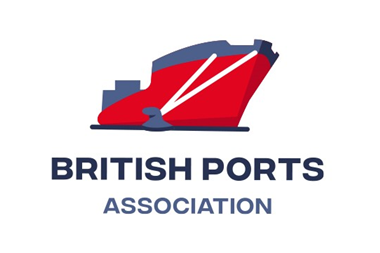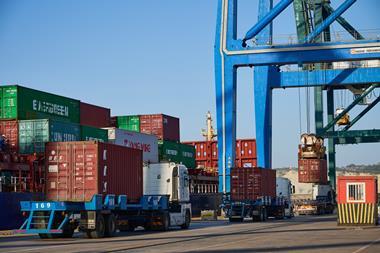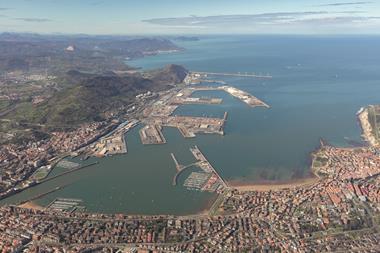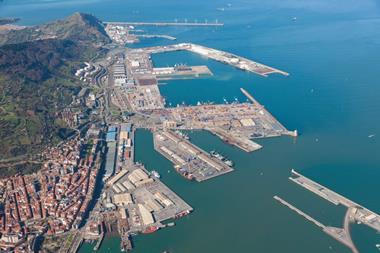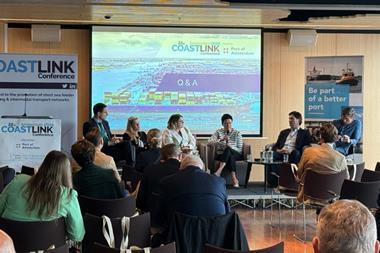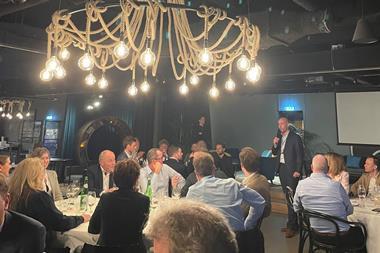The UK government must set a growth target for water freight, said Michelle Gardner, deputy director, policy, at Logistics UK. Highlighting the need for Net Zero, she called on the government “to have the right policies to help businesses go faster and further”.
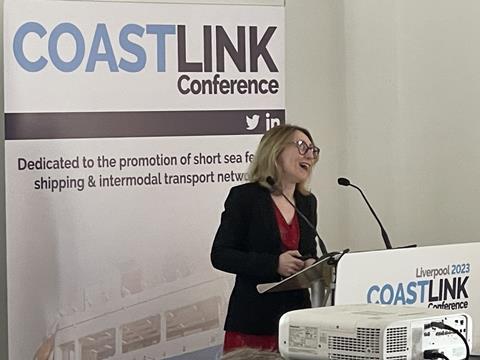
Certainty of policy is essential for businesses to invest in long-term capital assets,” said Gardner. “The government must set a growth target for water freight. We have been calling for a water freight target to be set and this must come with a coherent plan to make sure it can be delivered.”
She also said there was a need to protect land for wharves and access, “as access to wharves and development of ports is a direct obstacle to expanding water freight inland”.
Gardner called for a coordinated and integrated approach to infrastructure planning, investment and delivery that supports a UK-wide freight network and modal shift and said the government must work with planning authorities to raise awareness of the logistics sector.
“Innovation funding should be focused on the delivery of a green, efficient and integrated logistics sector,” she said. “We want to make sure government delivers.”
There was some debate during Coastlink’s discussions about how much government intervention was required to drive more sustainable logistics.
Claudio Veritiero, CEO of Peel Ports Group, said: “We are fortunate in the UK to have a model, compared to a number of other areas of UK infrastructure, where we are relatively deregulated. It might not seem to be the case sometimes but having worked in the construction sector and look at some of the regulations for energy generation, water etc., I think as an industry it works and the government has taken a relatively hands-off approach.
However, I think there are areas where we could do with more help – for example, the role of ports in regional economies and how you facilitate that. Port connectivity would be key area, which the government could do more around.”
Mike Garratt, Chairman, MDS Transmodal, noted the relative independence of ports industry – “but the flip side is that the government doesn’t always understand what the ports and shipping industry can contribute.”
Explaining an in-depth analysis of freight and modal trends, he said 62% of short sea traffic landed south of Ipswich, despite the great majority being bound for the Midlands and North. In developing the case for better connected ports within a green agenda, the government should look not just at user benefits but also at non-user benefits, such as reductions in emissions and congestion, said Garratt.
Crunching numbers to consider the impact if shortsea traffic was required to cover its environmental costs within Britain, he concluded the public interest saving per unit moved would be £13 – adding up to an annual public interest saving of £130m.
Analysis shows that unit load cargo is switching to northern ports and to unaccompanied modes, according to Garratt. “That itself encourages planning policy and infrastructure investment to facilitate that. Warehouse capacity generally is also driving north and expanding. Shortsea shipping has the capacity to support a green agenda by switching to alternative fuels.”
However, he noted a distortion in UK: “The railway industry does get grants for routes that would otherwise not be viable. It is sort of available to shipping but in practice not. It is extremely difficult to introduce and not distort the market – because it is not easily defined and the other end is likely outside the UK.”
The discussions also touched on government’s role in the provision on onshore power in ports. Claudio Veritiero said: “If the demand is correct, we will put the investment in – but we need parallel investment in energy infrastructure.”
The British government policy is to facilitate some of the innovation and investment through grants, he said, rather than a clear and robust “this is the way you are all going to go as port operators and shipping lines”.
Stephen Carr, group commercial director of Peel Ports, said: “I don’t think the government should interfere in the market in terms of dictating along which route goods should flow. What the government should do is tax those elements of transport that are not socially good: a way of nudging the market to a solution instead of forcing market to solution. The alternative is a lot of grants, but that is not financially sustainable.”


